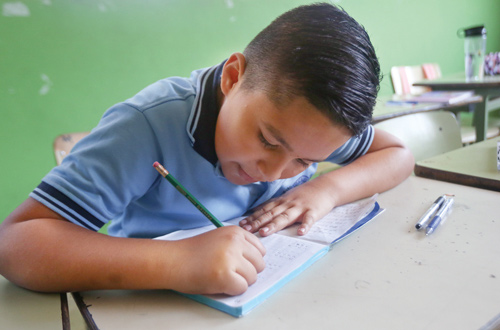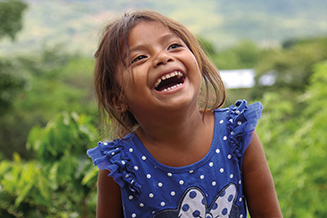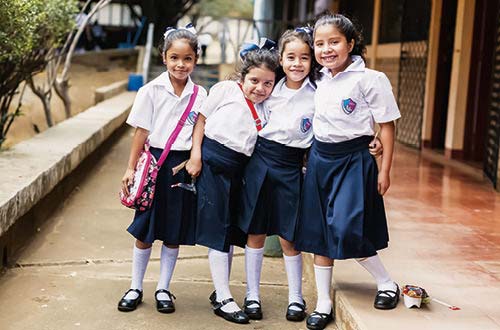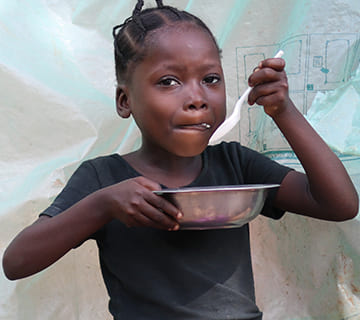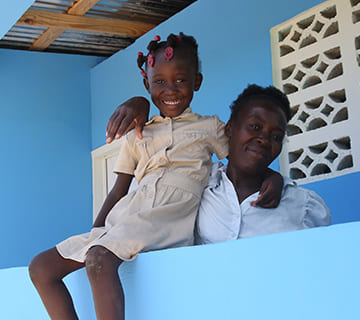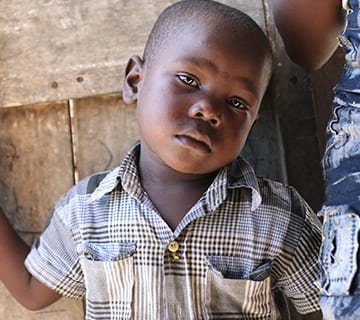
How We Help
We protect vulnerable children through our Angels Of Hope child sponsorship program.
- Our Angels of Hope sponsors support 7,001 orphaned and abandoned children in 176 children’s homes
- We work with 24 children’s homes in Haiti, nine throughout El Salvador and 45 in Honduras
- 1,072 orphaned or abandoned children are sponsored in Haiti, 256 in El Salvador, 303 in Nicaragua, and 2,725 in Honduras
Children In Need
Did you know that in the Caribbean and Latin America, 1 out of 20 children under the age of 5 is left at home alone or under the care of a child under 10 years old? Helping children in need is critically important.
Growing up in extreme poverty is vastly different in developing countries where daycare, preschool and community programs rarely exist.
Extremely impoverished parents focus on keeping their children alive and surviving from one day to the next.
Parents are in survival mode, which may mean that both parents are gone all day working or are away from home looking for ways to earn money to put food on the table. Some children will join their parents at work, harvesting crops alongside them. Some parents will migrate to where there is more work and leave their children in the care of relatives.
United Nations Children’s Fund (UNICEF) reports that there are 163 million children worldwide in need of a family, shelter or care.
Many children at risk for growing up without parental care and losing out on an education live in unstable environments isolated from communities, extended families and even live in abusive homes.
And without a solid foundation within a family unit, a child living in poverty is likely to miss out on the critical familial bond necessary to develop into a well-rounded, contributing member of their community.
Understanding a child’s environment
It’s essential to understand the factors that might lead to a child growing up at risk of losing the care of a parent.
When looking at the child’s neighborhood and community, what are the cultural and social, economic and political problems that confront them?
Cultural/social: Is there domestic violence happening in the home, is the child working to help their family, is there discrimination or barriers to getting an education or health care because of an indigenous background or a disability?
Economic: Is there a lack of access to safe housing, jobs and nutrition driving the family to migrate?
Political: Has gang violence or civil unrest forced the child’s family to migrate?
Doing their best to survive
Most families living in extreme poverty work as hard as possible to provide a better life for their children. But despite their best efforts, living in extreme poverty becomes a fight for survival to meet basic daily needs.
In single-parent families, the mother is usually the breadwinner and in charge of the family. As a result, the children stay home alone while their mothers work in jobs that pay little.
In Latin America, one young son left his home while his mother worked (even though she instructed him to stay home). He walked his neighborhood looking for work and found a job sweeping and picking up trash at a small store.
Thankfully, he lived in a small, tight-knit community where everyone watched out for one another. The store owner also happened to be the mayor of their township.
But unfortunately for the children who are not so lucky, they can get picked up by human traffickers and exploited, some never seeing their families again.
COVID-19 and orphaned children
The Center for Disease Control and Prevention (CDC) conducted a study that found nearly 1.5 million children had lost a parent, guardian grandparent or other family caregiver to the virus. Within 14 months of the pandemic, 1 million children lost one or both parents to the virus.
Investing in families and helping orphaned children
Many local and state governments in the Caribbean and Latin America do not have programs to help keep vulnerable families together. In many countries, foster care is not a public policy.
There is a difference between an orphanage and a children’s home in developing countries. An orphanage seeks to provide care for orphaned children in an institutional-type setting. This type of residence is not focused on holistically caring for children – taking into consideration the entire well-being of a child.
A children’s home, like FFTP’s Angels Of Hope donor-supported homes, employs extensively trained teams and staff skilled in areas that engage children who are orphaned or abandoned with positive growth – education, healthy social and emotional development and life skills for older children.
Food For The Poor works to keep children under their parent’s care whenever possible through its Angels Of Hope program.
Trained staff work to locate parents or other relatives, investigate abuse and work with families to solve any issues that prevent a parent from taking their child home.
Angels Of Hope recognizes the importance of children’s rights and honors the rights of the child to remain with their biological family and is committed to the well-being and development of a child in need.
In Angels Of Hope homes, the family-based care model is followed as closely as possible for children abandoned with no biological family willing or able to raise them.
When a child in need arrives at an Angels Of Hope home, they are immediately made to feel safe. Within time, the primary caregiver in the home discovers each child’s unique needs. A team is assigned, and a plan is developed.
Many children have always fended for themselves and do not trust or understand the dynamics of a family – one where the adult cares for the child.
The primary caregivers in each home monitor the children as they grow, which builds more lasting attachments.
Attachment is the emotional bond formed as a caring adult consistently meets a child’s needs over time.
Because of the consistent and meaningful interactions with their primary caregiver, the children’s lives are changed in a positive way. The child in need holistically receives love and connection.
Attachment affects a child’s lifelong ability to form healthy relationships, and for a child who has experienced trauma or loss, attachment is especially critical to healing.
This type of family-based care is essential for healing children with extensive needs.
Who are orphaned and abandoned children?
UNICEF describes an orphan as a child who has lost one or both parents.
Across the world, about 10,000 children per day are orphaned after losing their mother or father.
One of the most common reasons a child is left orphaned is natural disasters. The death of parents also occurs more frequently in impoverished households because of a lack of access to health services in underdeveloped countries and regions.
It only takes a chronic illness, or a disease left untreated to orphan a child.
Another type of orphan is a concept called social orphanhood. These children live with one parent still alive who is unable to fulfill their parental obligations.
When parents and other family members abandon a child, it is hard for the child to survive without help. Children can fall prey to local gangs or other people who might offer them food, shelter, protection and a sense of community but instead will hurt them. Helping children in need like this is critical.
Three sweet siblings:
Gerson, Sayra and Stephanie lived through abuse that no children should ever have to endure, but because of the committed staff at Angels Of Hope-supported homes and compassion of donors and friends like you, these children healed and moved on to brighter futures.
These three siblings were born in Latin America to parents living in extreme poverty with no means to feed or clothe their children. Soon after Sayra was born, their father abandoned them. The children’s mother didn’t feed, clothe or bathe the children. These little ones learned to fend for themselves, scrounging for scraps of food in the shack where they lived.
When concerned neighbors alerted local authorities to the inhumane conditions and neglect these precious children were suffering, the course of their lives changed forever. Stephanie was 4 years old, Sayra was 1, and Gerson was 3 when they arrived at an Angels Of Hope-supported home. They barely knew a word of Spanish and rarely spoke to anyone. All three children were covered in lice and were immediately sent to a hospital because of severe malnutrition. After being treated, they went to a nutrition center for recovery after which they were released into the loving care of an Angels Of Hope-supported home.
Life at the Angels Of Hope-supported home
Gerson was social and ready to dig into his new life at the orphanage, but his sisters were hesitant and quiet around the other children in the home. Staff at the home immediately enrolled all three children in a speech therapy class.
Progress made
The developmental damage that the severe malnutrition had brought about in the children, especially Gerson, was evident. Gerson was not able to walk when he arrived at the home, but after physical therapy he now runs and plays. His sisters are no longer shy and have also made new friends and love to play.
Siblings have a bright future
The future is truly bright for these three siblings. Their Angels Of Hope home staff teaches the children Spanish and English, which will give them an edge in the job world one day. Their Angels Of Hope-supported home also offers transitional housing and a support program for youths who are ready to go to college and ensures that young adults will secure a job after they graduate.
Your support counts
Every child deserves to grow up in an environment that nurtures them and to be raised by family members or by those who respect their rights, care for their well-being and development and provide them with a good education.
You can help orphaned and abandoned children
Food For The Poor supports the growth and development of children separated from family. We surround them with a community rooted in long-term relationships, trusted in-country partners, local churches and leaders.
When you become an Angel Of Hope sponsor, you support programs that give children stable, family-like home environments and instill love, values and a work ethic in young people who can become future leaders in their communities.
Sponsor a child today
Share God’s love with a precious child in the Caribbean or Latin America by providing a life-changing opportunity to rise above the effects of extreme poverty, abuse, trauma or abandonment.
By joining FFTP’s Angels Of Hope program, you will provide basic needs for your sponsored child – helping to change a life. As a sponsor, you will also receive updates and communication from your child.
Please become a sponsor today. Your presence in a child’s life will be a lasting blessing they will never forget!
God’s love
“We love because He first loved us.” (1 John 4:19, NIV)
The faithful support of cherished donors, local churches and dedicated staff make it possible to deliver God’s love to vulnerable children the moment they step into an Angels Of Hope home.
As a child learns and becomes the person God created them to be, your compassionate commitment paves the way to an incredibly bright future.
Older children discover their God-given talents and His purpose for their life through training and educational opportunities at each home.
These opportunities help to ensure that each child is equipped with the education, training and unique skills to succeed in life and take care of themselves.
Your life-changing support of these beautiful angels through the Angels Of Hope program gives each child the opportunity to finish strong and show the world the person God created them to be.
Thank you for prayerfully depositing hope and God’s love into the life of a child in need.
